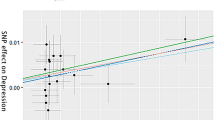Objective. To study the association between the kynurenine-3-monooxygenase (KMO) gene and depression. Materials and methods. Polymorphic loci rs2275163 (C/T) and rs1053230 (A/G) of the KMO gene were studied in patients with depression (study group) and mentally healthy subjects of comparable gender and age (control group). Results and conclusions. The rs2275163 polymorphism was not associated with depression. An association between the rs1053230 polymorphism and depression was found. The frequency of the GG genotype, linked with lower KMO activity and increased kynurenic acid levels in patients with endogenous psychoses, was greater in the study group than the control group (p = 0.001, OR 2.8 (95% CI 1.73–4.24). thus, the GG genotype can be regarded as a risk allele for developing depression.
Similar content being viewed by others
References
C. L. Raison, L. Capuron, and A. H. Miller, “Cytokines sing the blues: inflammation and the pathogenesis of depression,” Trends Immunol., 27, No. 1, 24–31 (2006), doi: https://doi.org/10.1016/j.it.2005.11.006.
R. Dantzer, J. C. O’Connor, G. G. Freund, et al., “From inflammation to sickness and depression: when the immune system subjugates the brain,” Nat. Rev. Neurosci., 9, No. 1, 46–56 (2008), doi: https://doi.org/10.1038/nrn2297.
J. M. Parrott and J. C. O’Connor, “Kynurenine 3-monooxygenase: an influential mediator of neuropathology,” Front. Psychiatry, 20, No. 6, 116 (2015), doi: https://doi.org/10.3389/fpsyt.2015.00116.
T. B. Meier, W. C. Drevets, B. E. Wurfel, et al., “Relationship between neurotoxic kynurenine metabolites and reductions in right medial prefrontal cortical thickness in major depressive disorder,” Brain Behav. Immun., 53, 39–48 (2016), doi: https://doi.org/10.1016/j.bbi.2015.11.003.
G. Rajkowska and J. J. Miguel-Hidalgo, “Gliogenesis and glial pathology in depression,” CNS Neurol. Disord. Drug Targets, 6, 219–233 (2007), doi: https://doi.org/10.2174/187152707780619326.
A. W. Corona, D. M. Norden, J. P. Skendelas, et al., “Indoleamine 2,3-dioxygenase inhibition attenuates lipopolysaccharide induced persistent microglial activation and depressive-like complications in fractalkine receptor (CX(3) CR1)-deficient mice,” Brain Behav. Immun., 31, 134–142 (2013), doi: https://doi.org/10.1016/j.bbi.2012.08.008.
J. M. Heisler and J. C. O’Connor, “Indoleamine 2,3-dioxygenase-dependent neurotoxic kynurenine metabolism mediates inflammation-induced deficit in recognition memory,” Brain Behav. Immun., 50, 115–124 (2015), doi: https://doi.org/10.1016/j.bbi.2015.06.022.
K. Fukuda, “Etiological classification of depression based on the enzymes of tryptophan metabolism,” BMC Psychiatry, 14, 372 (2014), doi: https://doi.org/10.1186/s12888-014-0372-y.
S. Claes, A. M. Myint, K. Domschke, et al., “The kynurenine pathway in major depression: haplotype analysis of three related functional candidate genes,” Psychiatry Res., 188, No. 3, 355–360 (2011), doi: https://doi.org/10.1016/j.psychres.2011.03.012.
C. L. Raison, R. Dantzer, K. W. Kelley, et al., “CSF concentrations of brain tryptophan and kynurenines during immune stimulation with IFN-alpha: relationship to CNS immune responses and depression,” Mol. Psychiatry, 15, No. 4, 393–403 (2010), doi: https://doi.org/10.1038/mp.2009.116.
R. Dantzer, J. C. O’Connor, M. A. Lawson, and K. W. Kelley, “Inflammation-associated depression: from serotonin to kynurenine,” Psychoneuroendocrinology, 36, No. 3, 426–436 (2011), doi: https://doi.org/10.1016/j.psyneuen.2010.09.012.
V. E. Golimbet, T. V. Lezheiko, M. V. Alfimova, et al., “The kynurenine-3-monooxygenase gene is associated with schizophrenia,” Genetika, 50, No. 6, 724–728 (2014), doi: https://doi.org/10.7868/S0016675814060034.
C. Lavebratt, S. Olsson, L. Backlund, et al., “The KMO allele encoding Arg<sup>452</sup> is associated with psychotic features in bipolar disorder type 1, and with increased CSF KYNA level and reduced KMO expression,” Mol. Psychiatry, 19, No. 3, 334–341 (2013), doi: https://doi.org/10.1038/mp.2013.11.
I. Wonodi, R. P. McMahon, N. Krishna, et al., “Influence of kynurenine 3-monooxygenase (KMO) gene polymorphism on cognitive function in schizophrenia,” Schizophr. Res., 160, No. 1–3, 80–87 (2014), doi: https://doi.org/10.1016/j.schres.2014.10.026.
Author information
Authors and Affiliations
Corresponding author
Additional information
Translated from Zhurnal Nevrologii i Psikhiatrii imeni S. S. Korsakova, Vol. 116, No. 12, Iss. 1, pp. 92–95, December, 2016.
Rights and permissions
About this article
Cite this article
Lezheiko, T.V., Golimbet, V.E., Andryushchenko, A.V. et al. Studies of the Association between the Kynurenine-3-Monooxygenase Gene and Depression. Neurosci Behav Physi 48, 416–419 (2018). https://doi.org/10.1007/s11055-018-0580-x
Published:
Issue Date:
DOI: https://doi.org/10.1007/s11055-018-0580-x




